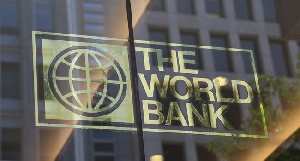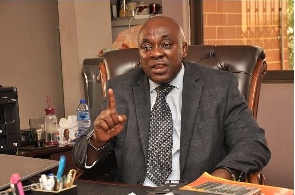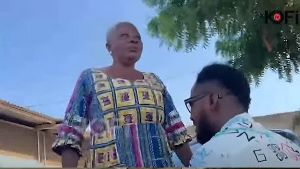The World Bank has released its latest updated outlook for Ghana’s economy. Although it is the Bank’s projection that the debt to Gross Domestic Product ratio could exceed 80 percent by 2023 has dominated the headlines, the report provides cause for optimism as well although it warns that the adverse economic impacts of COVID-19 have far from run their course.
Indeed it notes that: “The COVID-19 crisis has substantially weakened Ghana’s growth outlook. Prior to the pandemic, economic growth was projected at 5.8 percent for 2020 and about 5.5 percent over the medium term (2020-2023). Inflation was expected to remain in single digits, and fiscal consolidation was expected to be sustained, with the overall fiscal deficit narrowing from 7.5 percent in 2019 to 6.4 percent of GDP in 2020 and about 5 percent of GDP by 2022.
Ghana’s external position was also expected to remain stable, with a current-account deficit of 3.4-3.6 percent of GDP between 2020 and 2022, adequately financed by FDI as well as official and private capital inflows (with a marginal increase in reserves).
“An upgrade of Moody’s outlook for Ghana from stable to positive in January 2020, along with the successful placement of US$3 billion in Eurobonds in February 2020, supported the narrative of an overall successful macroeconomic turnaround since 2017. However, the impact of the pandemic on the economy and people’s wellbeing has significantly lowered these growth projections.
“The short-term outlook has deteriorated sharply, with significant uncertainty around the medium-term pace of the economic recovery. The severity of the crisis in Ghana depends not only on the actual spread and duration of the domestic COVID-19 outbreak, but also on the post-crisis growth path of the global economy. The short-term negative impact will come through a decline in external demand, fall in commodity prices (particularly of oil), and lower FDI and tourism receipts. Given the severity of the crisis, the economic recovery is likely to be modest even under the best-case scenario, as the global economic recession is expected to persist into 2021, and trade, investment, and tourism activities may take longer to recover to pre-crisis levels. Besides, a long-planned maintenance project for an oil field in Ghana is expected to reduce oil production in 2022.”
However the latest report also identifies aspects of Ghana’s economy that are promising and indeed economic analysts are suggesting that this part of the report contributed to the retained confidence of bond investors on the international capital market as shown by the oversubscription of the latest Eurobond issuance.
“On the upside, non-oil activities, including agriculture and agribusiness, will continue to support overall growth, which is expected to average 1.7 percent over the medium term” the World Bank report predicts; although that growth forecast remains controversial being that it is far lower than government’s own target of 5.0 percent and indeed is also well below most other forecasts made by independent research institutions both foreign and local.
“The government has created the medium-term COVID-19 Alleviation and Revitalization of Enterprises Support (CARES) program to mitigate the impact of the pandemic on the lives and livelihoods of Ghanaians, ensure a quick recovery from the pandemic, and create a stronger and more resilient economy.
“While inflation is expected to accelerate above 10 percent in 2020, it should return within the BoG’s medium-term target range of 6-10 percent by 2021. A breakdown of the drivers of inflation in the second quarter of 2020 reveals that the rise of inflation was mainly caused by higher inflation expectations and supply shocks from higher food prices.
However, underlying inflationary pressures appear to have stabilized, and the inflation rate could return to the BoG’s medium-term target range of 8±2 percent by 2021. A combination of factors will affect inflation. The significant deterioration of most indicators in the real sector suggests low inflationary pressure from domestic demand for the rest of the year. Still, while recent water and electricity subsidies may have created downward pressure on inflation, the general increase in government expenditures, due to the COVID-19 pandemic, will generate upward inflationary pressure. The BoG’s MPC noted that, with a larger budget deficit and a residual financing gap, there is a need for monetary restraint to preserve the anchors of macroeconomic stability.”
The World Bank is also optimistic about Ghana’s commitment to fiscal consolidation which remains the most crucial aspect of the country’s macro-economic management.
“The fiscal deficit (including financial- and energy-sector costs) is expected to average 7.6 percent of GDP per year in 2021-23. It is expected to narrow to a pre-crisis level of around 5 percent of GDP by 2023. Since the implementation of reforms in the financial sector, which averaged 2.3 percent of GDP per year in 2018-2020, is expected to be completed in 2020, no further costs are expected in 2021, creating immediate fiscal space. Reflecting the government’s commitment to pursue energy-sector reforms throughout the crisis period, the fiscal framework also includes an allocation of about 1 percent of GDP each year over the medium term to close the financing gap in the energy sector over the ESRP’s implementation period.”
The report is also optimistic about Ghana’s external sector performance. “Over the medium term, increased exports are expected to result in a gradual narrowing of the current-account deficit to 3.1 percent of GDP by 2023. However In the absence of any additional foreign financing, an increase in BoP financing needs, through an increase in the current account deficit and/or higher than projected outflows, would lead to a further drawdown of reserves
The World Bank report identifies several potential downside risks:
• A prolonged COVID-19 crisis, both in Ghana and globally, with persistent low oil prices and subdued economic activity. This is the biggest downside risk, as extended external demand and terms-of-trade shocks could reduce Ghana’s trade, investment, and tourism activities. This could lead to a slower recovery in 2021, which could even extend into 2022, with growth remaining below 2 percent;
• Substantial rollover risks for Ghana’s debt, especially Eurobonds and short-term domestic debt. The economic outlook is predicated on continued market access as global financial conditions ease. Non-resident investors hold about one-quarter of the government’s domestic debt, and rollover risks have worsened given the higher financing needs in 2020 and the erosion of investor confidence toward emerging economies;
• Considerable fiscal slippages due to both the elections in 2020 and contingent liabilities in the energy sector. Energy sector liabilities in excess of the fiscal provisions for the implementation of the ESRP could further exacerbate fiscal pressures. The weak financial situation of some SOEs, particularly in the energy sector, creates significant contingent liabilities for the government; and
• Vulnerabilities in the financial sector that will likely persist over the medium term. The BoG’s balance sheet will need to be shielded from further losses and strengthened over time (IMF 2019b). Operating losses due to the impairment of uncollateralized loans to commercial banks have weakened the BoG’s equity position, and recoveries from the various receivership operations are only slowly materializing. Additional risks could materialize with regard to the resolution of SDIs, particularly given the initial allocation of lower-than-projected resources required to compensate small depositors. In addition, preliminary data suggest that the deposit base may be larger than expected, which would require additional resources to compensate SDIs’ depositors. Additional costs may stem from the possible compensation of investors of distressed fund managers following license revocations by the Securities and Exchange Commission. To account for this, the fiscal framework for 2020 included a provision for continued reforms in the financial sector at around 0.5 percent of GDP.
However the report notes that government’s swift response to the COVID-19 crisis has to a significant extent mitigated these risks. The government is also seeking additional resources from international financial institutions, and it has demonstrated its strong commitment to fiscal stability, as shown by its track record of prudent macroeconomic management since 2017. For instance, it established a fiscal deficit rule, created fiscal and financial stability councils, and has implemented financial-sector reforms since 2018.
The report also provides various key policy options that Ghana should consider in order to improve its economic position.
Firstly it notes that Ghana’s tightening fiscal envelope presents authorities with a critical opportunity to overhaul tax expenditures, strengthen the tax administration, and broaden the tax base.
“In the face of a widening fiscal gap, the authorities should develop a roadmap for fiscal consolidation to return to the fiscal path the country was on before the pandemic.” The World Bank recommends. Indeed the World Bank’s 2017 Public Expenditure Review for Ghana estimated the country’s tax exemptions at 5.3 percent of GDP, and the government has submitted a tax exemptions bill to Parliament to reform the exemption regime.
The report further recommends that the authorities also need to focus on widening the tax base by implementing the recently approved revenue administration bill.” If enacted, this bill would provide a framework for a long-term volunteer scheme to promote self-declarations of variances, omissions, and underreporting, as well as to establish a tax appeals board to facilitate tax arbitration. This would facilitate tax compliance for MSMEs and individuals through easier voluntary declarations and a timely and independent resolution mechanism for tax disputes.”
Finally, the implementation of an effective property tax regime needs to be fast-tracked to address the revenue gap faced by local governments says the World Bank.
“To ensure a timely return to fiscal consolidation, the government needs to reaffirm the fiscal anchor and phase out COVID-19 support measures. The government needs to ensure that fiscal measures implemented to address the crisis are time-bound. Unplanned health spending and the adoption of a stimulus package targeting the real sector have resulted in large expenditure outlays in 2020.
“For example, the government created the medium-term COVID-19 Alleviation and Revitalization of Enterprises Support (CARES) program to mitigate the economic impact of the pandemic, and the program, which has short and medium-term phases, needs to be efficiently implemented.
“Moreover, the authorities need to reaffirm the fiscal anchor to guide the fiscal consolidation process and ensure that public spending is sustainable.
“The government, therefore, needs to: (i) indicate a clear timeline to reinstate the fiscal rule, and (ii) increase the flexibility of the budget by further limiting statutory spending.”
- IMF under pressure to cut billions of dollars in fees for large borrowers
- Central Banks must be free of election-year political pressures - IMF warns
- Ghana's economic stability path will be painful – IMF boss
- Establish fiscal council to check excessive spending – IMF to government
- IMF Managing Director leaves Ghana after fruitful 2-day visit
- Read all related articles













